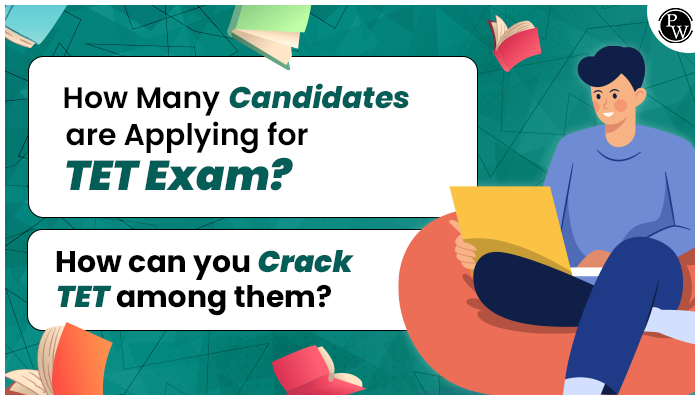How Many Candidates are Applying for TET and How Can You crack TET Among Them

Have you ever heard of teacher eligibility tests? YES! Even teachers with all necessary degrees and credentials must take eligibility exams. These assessments certify them as experts. They can then submit an application and be qualified for hiring as government-certified educators. Nearly 2.5 lakh instructors and teachers seeking admission to prestigious public and private schools have applied for the teacher eligibility test or TET.
TET, commonly referred to as the Teacher Eligibility Test, is an entrance test for teachers. For Class 1 through Class 8 teaching positions in government schools, the test is required. Paper 1 is intended for teachers choosing classes 1 through 5, and Paper 2 is for classes 6 through 8.
The exam lasts 2.5 hours and is an objective type test for a total of 150 points. There are no deductions for incorrect responses. CTET The Central Board of Secondary Education (CBSE) administers the Central Teacher Eligibility Test (CTET) to Indian candidates to determine their eligibility for appointment as teachers in schools owned and operated by the Government of India and in schools.
| Table of Content
1. What is TET? 2. Eligibility criteria for TET. 3. Syllabus and exam pattern. 4. Section-wise tips and tricks. 5. Recommended Books for TET/CTET preparation: 6. Scorecard and its Validity 7. Conclusion 8. FAQ. |
What is TET?
The Indian government launched the TET test in 2011, giving teachers two years of time to qualify. Every state’s government administers the TET test, and the national government and CBSE administer the CTET test. The government keeping in mind the RTE act took a significant step in this direction in order to ensure that all teachers are of a high caliber. Uttar Pradesh (UPTET)-UPTET- All you need to know about it, West Bengal (WBTET), Haryana (HTET), Tamil Nadu (TNTET), Karnataka (KARTET), Uttrakhand (UTET), Rajasthan (REET), Himachal Pradesh (HPTET), and Odisha(OTET) are the other states that administer TET exams.
Eligibility criteria for TET
States may have different requirements for TET, CTET, and other teacher eligibility tests run by the central and state governments, but practically all of them follow the same guidelines. The test is basically divided into two portions, called Paper 1 and Paper 2. The following is a list of who is eligible for each section.
Eligibility criteria for Paper 1
- The applicant must have passed class 12 or an equivalent exam with at least 50% of the possible points. The candidate should have completed or be in the last year of a 2-year elementary education diploma/ 4-year bachelor’s degree program.
- A minimum age of 18 or older is required.
- There is no maximum age to apply for TET, CTET or any of the other state-level TET tests.
- A candidate can apply as often as desired as long as they pass the TET/CTET/Equivalent state-level eligibility tests with a high score.
Eligibility criteria for Paper 2
- The applicant must have cleared class 12 or equivalent with a minimum of 50% of marks. The candidate should have passed or must be in the final year of a 2-year Diploma of Elementary Education course/4 year Bachelor of Elementary Education course.
- Must have passed graduation with 45% marks.
- If the applicant has a post-graduate degree and is qualified, then they must have received at least a 55%.
- Must be a minimum or above 18 years of age.
- There’s no upper age limit for applying for TET or CTET or the rest of the state-level TET exams.
- An applicant can apply as often as he/she wants to get a good score and clear
TET/CTET/Equivalent state-level eligibility tests.
Eligibility criteria for reserved sections: The eligibility criteria remain the same for the reserved sections and there is no specific number of seats reserved for them as well. However, the cutoff scores are relaxed by 5% for candidates in the reserved category.
Syllabus and exam pattern:
The TET and CTET exams include a broad range of course material, primarily from the NCERT books and curriculum. As is common knowledge, there are two portions of the test, the paper I(classes 1-5) which the applicant needs to clear in order to be a certified primary teacher, and paper II(classes6-8) if the candidate wants to become a certified TGT teacher. Each paper has 150 questions, and the allotted time is two hours and thirty minutes. It is not necessary that the candidates should apply for both papers. One can choose the classes one wants to qualify the exam for and apply for that particular paper.
Syllabus for Paper 1(classes 1-5)
- Child pedagogy and development: Child Development, Learning, and Pedagogy
- The language I: Comprehension, Pedagogy of Language Development
- Language II: Comprehension, Pedagogy of Language Development
- Mathematics: Geometry, Shapes & Spatial Understanding, Solids around Us, Numbers, Addition and Subtraction, Multiplication, Division, Data Handling, Weight, Time, Patterns, Money, Measurement, and pedagogical issues related to these chapters.
- Social studies/ Environmental studies: Relationships, Work and play, Animals, Plants, Food, Shelter, Water, Travel, Things we do, and pedagogical issues related to it.
Syllabus for Paper 2(classes 6-8)
- Child pedagogy and development: Child Development, Learning, and Pedagogy
- The language I: Comprehension, Pedagogy of Language Development
- Language II: Comprehension, Pedagogy of Language Development
- Mathematics; Number system, Whole Numbers, Negative Numbers and Integers, Fractions, Algebra, Ratio Proportion, Geometry, Construction, Mensuration, and the pedagogical issues related to these.
- Science or Social studies: Food, Materials, The world of the living, Moving Things People and Ideas, Natural Phenomena, Natural Resources, How Things Work, New Ideas, The First Empire, Political Developments, Kings and Kingdoms, Culture and Science, Colonialism, Revolt of 1857-58, Caste System, India after Independence, Globe, Environment, Resources, Agriculture, Diversity, Government, Democracy, The Indian Constitution, Judiciary, etc. and the pedagogical issues related to it.
Exam Pattern: TET or CTET is essentially an objective type examination. There are two papers in the test: paper 1 and paper 2. Both exams have 150 multiple-choice questions, and the time allotted for completion is two hours and thirty minutes.
Marking Scheme of Paper1
| SUBJECTS | Number of Questions | Marks |
| Child Development and Pedagogy | 30 | 30 |
| Language I | 30 | 30 |
| Language II | 30 | 30 |
| Mathematics | 30 | 30 |
| Social Studies | 30 | 30 |
| Total | 150 | 150 |
Marking Scheme of Paper 2
| Subjects | Number of questions | Marks |
| Child Development & Pedagogy | 30 | 30 |
| Language-I | 30 | 30 |
| Language-II | 30 | 30 |
| Mathematics and Science (for Mathematics and Science teachers)
OR Social Studies/Social Science (for Social Studies/Social Science teacher) OR Mathematics, Science, and Social Studies/Social Science (for teachers of any other subject) |
60 | 60 |
| Total | 150 | 150 |
NOTE: Each question carries 1 mark and there is no negative marking for any wrong answer.
Tips and tricks to crack TET
Subject-wise tips and tricks would assist a candidate in building his or her strategy for the TET examination. Best tips and techniques for the Preparation Guide to Crack Super TET Examination in 3 Months are shared below to help candidates better prepare for the exam.
- The first and foremost step for preparing for TET is being well aware of exam patterns and syllabi. The most crucial strategy of preparation is the syllabus and the exam pattern, both prescribed by authorities to candidates.
- The candidates should start their practice with full concentration to construct their basics in every subject.
- Child Pedagogy and Development is both papers’ most important scoring section.
- One must understand the concepts of this part, especially focusing on Piaget’s theory, Kohlberg’s Theory, and Vygotsky’s Theory of child development.
- For the rest of the sections, one must go through the theNCERT books, especially for the maths, science, and social studies parts.
- One must make their own notes.
- Candidates can conduct as many Mock tests for the TET to check their potential to answer actual question papers in the allotted timeframe.
- Candidates are required to evaluate themselves using practice exams once they have completed the program.
- Formulating an appropriate schedule and preparatory tips may help the candidate TET in their first attempt.
- The candidates aspiring to appear for Teacher Qualification Test can take the help of expert tips followed by candidates in the past.
- Subscription of offline and online courses is advised for students as there are ample study materials available in digital mode. One can subscribe to the best online course such as the course offered by Physics Wallah and various others needed for the preparation.
Recommended Books for TET/CTET preparation:
As recommended one must go through the NCERT books for the complete knowledge of the course as they cover almost all the domains other than the Child Pedagogy and Development part. Here is a list of some books that can prove to be beneficial in the preparation for the TET/CTET exam.
- The TET Exam Guide by J.P.Sharma and Manish Gupta.
- TET Exam Analysis by R.K.Sharma
- TET Syllabus and Strategy by Dr. A.K.Singh
- TET in One Day by S.K.Tripathi
- TET Exam Guide Preparation by Vibha Gupta
6. English and Pedagogy Language 1 by Geeta Sahni
- Mathematics: CTET & TETs for Class I-V Mathematics & Pedagogy by Arihant
- Child Development and Pedagogy by Sandeep Kumar.
- CTET Master Paper II Teacher Selection in VI-VIII Maths and Science by Arihant.
- Success Master Science/Social Studies Paper II by Arihant
- Environmental Studies & Pedagogy Class I-V by Arihant And Disha publications
Scorecard and its Validity
The minimum cut-off mark is basically 60% i.e 90/150 in each paper for the general category and for the reserved category is 55% i.e 82/150 in each paper. The validity of the score varies from 7 years to a lifetime depending upon the various exam-conducting authorities.
Conclusion
TET/CTET evaluates a teacher’s eligibility. The essential consideration when taking these exams is the syllabus, which should be strategically covered by maintaining a sound study schedule. We are all aware that practice is the key to success. Therefore, applicants will benefit from regular practice with the exam series. Above all, maintaining a healthy body and mind will enable you to succeed in the TET/CTET
Read more:- Issues In Academic Writing In Higher Education
Frequently Asked Questions(FAQ)
Q1. What is TET Exam?
Ans. The TET is the Teacher’s eligibility test and it is conducted at both the national and state level.
Q2. What is the minimum qualification for the TET test?
Ans. The candidate must have completed class 12 and must be appearing in the final year exams for a bachelor of elementary education.
Q3. Is CTET and TET exam the same?
Ans. No CTET is conducted by the Central Govt. as a criterion of eligibility test for teachers whereas TET is conducted by the various State Govts.
Q4.Is TET necessary for teachers?
Ans. Yes, qualifying for the TET exam is a must for getting recruited by central and state govt. Schools.
Q5. Which is better TET or UGCNET?
Ans. TET is the eligibility test for school teachers whereas UGCNET is the requirement for college teachers or professors.






